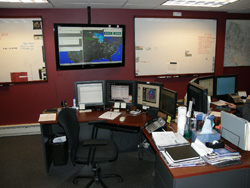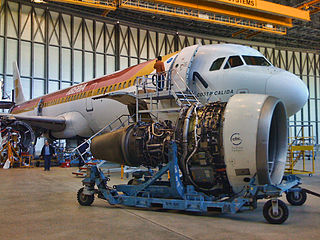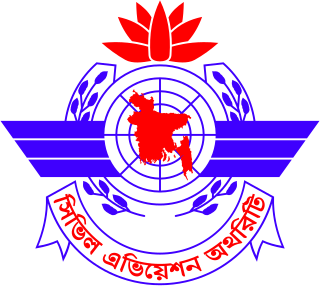Related Research Articles

General aviation (GA) is defined by the International Civil Aviation Organization (ICAO) as all civil aviation aircraft operations except for commercial air transport or aerial work, which is defined as specialized aviation services for other purposes. However, for statistical purposes, ICAO uses a definition of general aviation which includes aerial work.
The Federal Aviation Regulations (FARs) are rules prescribed by the Federal Aviation Administration (FAA) governing all aviation activities in the United States. The FARs comprise Title 14 of the Code of Federal Regulations. A wide variety of activities are regulated, such as aircraft design and maintenance, typical airline flights, pilot training activities, hot-air ballooning, lighter-than-air aircraft, human-made structure heights, obstruction lighting and marking, model rocket launches, commercial space operations, model aircraft operations, Unmanned Aircraft Systems (UAS) and kite flying. The rules are designed to promote safe aviation, protecting pilots, flight attendants, passengers and the general public from unnecessary risk.
Aviation is the design, development, production, operation, and use of aircraft, especially heavier-than-air aircraft. Articles related to aviation include:

The Civil Aviation Authority (CAA) is the statutory corporation which oversees and regulates all aspects of civil aviation in the United Kingdom. Its areas of responsibility include:

A private pilot licence (PPL) or private pilot certificate is a type of pilot licence that allows the holder to act as pilot in command of an aircraft privately. The basic licence requirements are determined by the International Civil Aviation Organization (ICAO), but implementation varies from country to country. According to ICAO, an applicant must be at least 17 years old, demonstrate appropriate knowledge and skill, and hold at least a Class 3 medical certificate. Different PPLs are available for different categories of aircraft, such as aeroplane, helicopter, airship, etc., and are not interchangeable, although experience from a PPL in one category may be credited towards the issue of another.
A commercial pilot licence (CPL) is a type of pilot licence that permits the holder to act as a pilot of an aircraft and be paid for their work.

An aircraft mechanic, aviation mechanic or aircraft maintenance technician (AMT) is a tradesperson who carries out aircraft maintenance and repairs. AMTs inspect and perform or supervise maintenance, preventive maintenance, repairs and alteration of aircraft and aircraft systems.
Pilot licensing or certification refers to permits for operating aircraft. Flight crew licences are issued by the civil aviation authority of each country, which must establish that the holder has met minimum knowledge and experience before issuing licences. The licence, along with the required class or type rating, allows a pilot to fly aircraft registered in the licence issuing state.

Pilot certification in the United States is typically required for an individual to act as a pilot-in-command of an aircraft. It is regulated by the Federal Aviation Administration (FAA), a branch of the U.S. Department of Transportation (USDOT). A pilot may be certified under 14 Code of Federal Regulations (CFR) Part 61 or 14 CFR Part 141. Pilots may also be certified under 14 CFR Part 107 for commercial drone operations.
An Aviation Medical Examiner or Aero-medical Examiner (AME) is a physician designated by the national aviation authority and given the authority to perform flight physical examinations and issue aviation medical certificates. AMEs are practitioners of aviation medicine, although most are also qualified in other medical specialties.

A flight instructor is a person who teaches others to operate aircraft. Specific privileges granted to holders of a flight instructor qualification vary from country to country, but very generally, a flight instructor serves to enhance or evaluate the knowledge and skill level of an aviator in pursuit of a higher pilot's license, certificate or rating.

A flight dispatcher assists in planning flight paths, taking into account aircraft performance and loading, enroute winds, thunderstorm and turbulence forecasts, airspace restrictions, and airport conditions. Dispatchers also provide a flight following service and advise pilots if conditions change. They usually work in the operations center of the airline. In the United States and Canada, the flight dispatcher shares legal responsibility with the commander of the aircraft.

A type rating is an authorization entered on or associated with a pilot license and forming part thereof, stating the pilot's privileges or limitations pertaining to certain aircraft type. Such qualification requires additional training beyond the scope of the initial license and aircraft class training.

Aircraft maintenance is the performance of tasks required to ensure the continuing airworthiness of an aircraft or aircraft part, including overhaul, inspection, replacement, defect rectification, and the embodiment of modifications, compliance with airworthiness directives and repair.

Civil Aviation Authority of Bangladesh (CAAB) functions as the regulatory body for all aviation related activities in Bangladesh. It is the civil aviation authority operating under the Ministry of Civil Aviation & Tourism. All nine operational airports are operated by the CAAB. A member of International Civil Aviation Organization, it has signed bilateral air transport agreement with 52 states. It is headquartered in Kurmitola, Dhaka.
Medical certifications for aircraft pilots are specified by the International Civil Aviation Organization (ICAO). ICAO sets standards and recommended practices (SARPS), which are specified in Annex 1 to the Convention on International Civil Aviation.

In aviation, V-speeds are standard terms used to define airspeeds important or useful to the operation of all aircraft. These speeds are derived from data obtained by aircraft designers and manufacturers during flight testing for aircraft type-certification. Using them is considered a best practice to maximize aviation safety, aircraft performance, or both.
The Directorate General of Civil Aviation (DGCA) is a statutory body of the Government of India to regulate civil aviation in India. It became a statutory body under the Aircraft (Amendment) Act, 2020. The DGCA investigates aviation accidents and incidents, maintains all regulations related to aviation and is responsible for issuance of licenses pertaining to aviation like PPL's, SPL's and CPL's in India. It is headquartered along Sri Aurobindo Marg, opposite Safdarjung Airport, in New Delhi. The Government of India is planning to replace the organisation with a Civil Aviation Authority (CAA), modelled on the lines of the American Federal Aviation Administration (FAA).
In Canada an Aircraft maintenance engineer (AME) is a person who is responsible for signing the maintenance release of certified aircraft and is licensed to do so by the national airworthiness authority, Transport Canada (TC). Their job is to ensure that aircraft are maintained in a safe condition.

Indian Institute Of Aeronautics (IIA) is one of the oldest aircraft maintenance training institutes in New Delhi, India. It was founded by avid aviator Captain Ram Niwas Sinha in 1982. In 1983 IIA earned approval from the Director General of Civil Aviation (DGCA), Govt. of India. IIA was transferred to Mundka, New Delhi from its initial approved base of Patna Airport in the year 2001. IIA is active in the field of Aircraft Maintenance Training through generations of trained technical manpower for the Airlines / Aviation Industry.
References
- 1 2 ICAO Personnel Licensing FAQ. (retrieved 22 December 2015)
- 1 2 3 FAA Aviation Maintenance Technician Handbook – General, Chapter 12: Publications, Forms, and Records Archived 21 October 2013 at the Wayback Machine , Page 12-20, CFR Part 43 – Maintenance, Preventive Maintenance, Rebuilding, and Alteration, §43.17 Maintenance, preventive maintenance, or alterations performed on U.S. aeronautical products by certain Canadian persons: "This section was significantly revised in 2005 as the result of a Bilateral Aviation Safety Agreement (BASA) between the United States and Canada. The two countries have enjoyed a long and professional relationship with respect to reciprocal aviation maintenance activity. This section of part 43 both defines some terms and gives specific limitations as to what an aviation maintenance engineer (AME is the Canadian equivalent to the U.S. A&P) may do to maintain U.S.-registered aircraft located in Canada. It also provides similar limitations for an Approved Maintenance Organization. (AMO is the Canadian equivalent to the U.S.-certified repair stations.)"
- ↑ Aircraft Maintenance Engineering, Sunsea Aviation Services Ltd. (retrieved 5 August 2022)
- ↑ Transport Canada (July 2010). "Canadian Aviation Regulations Part IV – Personnel Licensing and Training – Subpart 3 – Aircraft Maintenance Engineer Licences and Ratings". Archived from the original on 16 January 2011. Retrieved 22 February 2011.
- ↑ Transport Canada (July 2010). "Part V – Airworthiness Manual Chapter 566 – Aircraft Maintenance Engineer (AME) Licensing and Training" . Retrieved 22 February 2011.
- ↑ How to be An Aircraft Maintenance Engineer, Civil Aviation Authority of New Zealand, 1999.
- ↑ Maintenance Engineer, IAA. (Retrieved 11 June 2021)
- ↑ AMROBA discussion document, 2013: "The vast majority of [Asian] countries have ‘adopted’ the European Aviation Safety Authority (EASA) Part 66/147 aircraft maintenance engineer (AME) licensing and training requirements."